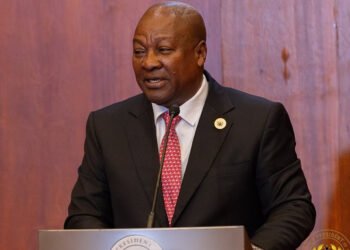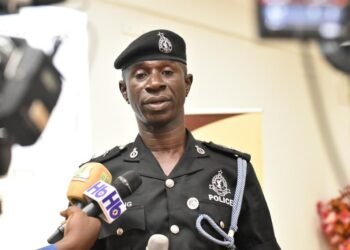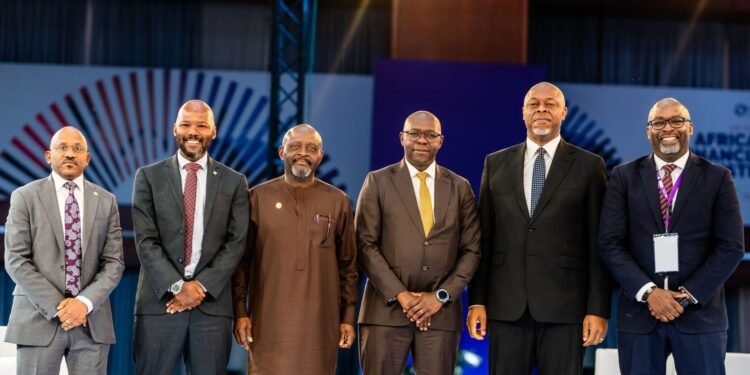Public outcry over the devastating impact of illegal mining, known locally as ‘galamsey,’ has reached a fever pitch as alarming new reports paint a grim picture of Ghana’s ecosystem and natural resources.
The Forestry Commission recently disclosed that a staggering 38 per cent of the nation’s forest reserves have been lost to illegal mining activities.
Compounding this environmental crisis, the Ghana Water Company Limited (GWCL) announced that the availability of potable water produced has plummeted from 70 per cent to a perilous 40 per cent nationwide, primarily due to the ravages of galamsey.
These revelations have reignited debates about the nation’s leadership and its role in combating this existential threat.
Professor Kojo Yankah, Founder of the PanAfrican Heritage Museum (PAHM) and the African University College of Communications (AUCC), in a scathing critique, criticized the ruling government’s handling of the galamsey crisis.
The renowned statesman, in his scathing critique, lamented the failure of leadership across successive administrations, arguing that the current situation is a direct result of inadequate and inconsistent governance.
“Galamsey reared its head before President Mahama lost the 2016 Elections. Come President Akufo Addo who gave so much hope by putting his Presidency on the line. Some of us loved it because a grave situation like Galamsey could not, and cannot, be controlled by an Association of Professional Bodies (or any CSO).
“The President rightly appointed an Inter-Ministerial Committee backed by ALL the Security Agencies – the most powerful instrument to handle such a critical issue”.
Professor Kojo Yankah, Founder of the PanAfrican Heritage Museum (PAHM) & African University College of Communications (AUCC)
However, Professor Yankah pointed out that the results have been far from satisfactory, recounting that one of the most notable early actions of the committee was the arrest of a Chinese national, Aisha Huang, a key figure in the illegal mining industry.
Yet, Professor Yankah indicated that her subsequent release, reportedly for “diplomatic reasons,” raised serious concerns about the government’s commitment to its own policies.
According to Professor Yankah, this incident emboldened others in positions of power to engage in illegal mining activities, setting a dangerous precedent that has since exacerbated the problem.
The Unanswered Questions and the Need for Accountability
Professor Yankah further questioned the lack of transparency and accountability, asking who is behind these criminal activities and why the government has not taken decisive action against those responsible.
He cited the brutal murder of Major Mahama, which remains unresolved, further underscoring the complex and dangerous nature of the galamsey issue.
“Who has been put before the court to restrain the other offenders? Who is behind those criminals causing such levels of devastation? We are still waiting for Government action on the comprehensive report produced by the eminent reputable scientist/doctor Professor Frimpong Boateng”.
Professor Kojo Yankah, Founder of the PanAfrican Heritage Museum (PAHM) & African University College of Communications (AUCC)
Missed Opportunities for Broader Involvement
Professor Yankah also criticized the government for its failure to engage key stakeholders such as the National House of Chiefs and non-governmental organizations (NGOs) in the fight against illegal mining.
He argued that a more inclusive approach, including bipartisan town hall meetings, could have galvanized public support and enhanced the effectiveness of the anti-galamsey efforts.
“At least, now we know that Ghana Water Company has officially announced that Ghana faces a Water Crisis. The Forestry Commission has confirmed that our Forest has been badly depleted”.
Professor Kojo Yankah, Founder of the PanAfrican Heritage Museum (PAHM) & African University College of Communications (AUCC)
Professor Yankah highlighted the shocking revelation that a deceased political party boss had even willed part of Ghana’s forestry reserves to his family members, a stark example of the extent of corruption and complicity within the system.

A National Betrayal: The Need for Immediate Action
In Professor Yankah’s view, the government possesses all the necessary tools and authority to arrest and prosecute anyone involved in illegal mining, regardless of their political or social affiliations.
He expressed deep disappointment that the current administration has not fulfilled its promise to protect the nation’s environment and natural resources.
With the 2024 elections on the horizon, Professor Yankah questioned what, if anything, the government can do to salvage the situation.
He called for President Akufo-Addo to address the nation on the state of its natural resources, urging him to be honest about the failures that have led to this crisis.
“The truth must be told,” he asserted, emphasizing that the ongoing environmental destruction is a major contributing factor to the country’s economic woes—a reality that he argues has been ignored out of intellectual dishonesty.
As Ghana wrestles with the consequences of the unchecked menace of illegal mining, Professor Yankah underscored the need for the government to be held accountable for its promises, actions, and inactions.
He warned against the dangers of political equalization, where blame is shared without addressing the root causes of the problem.
According to him, this approach only serves to perpetuate the crisis, allowing those responsible to escape accountability.
In conclusion, Professor Yankah’s remarks serve as a critical reminder of the urgent need for decisive action to combat galamsey and protect Ghana’s natural resources.
The time for rhetoric must be over; what the country needs now is strong leadership, transparency, and a commitment to reversing the damage that has already been done.
Failure to do so, as he earlier warned, will not only endanger the environment but also the very future of Ghana.
READ ALSO: Kwaku Manu Addresses Portia Asare’s ‘Juju’ Claims






















